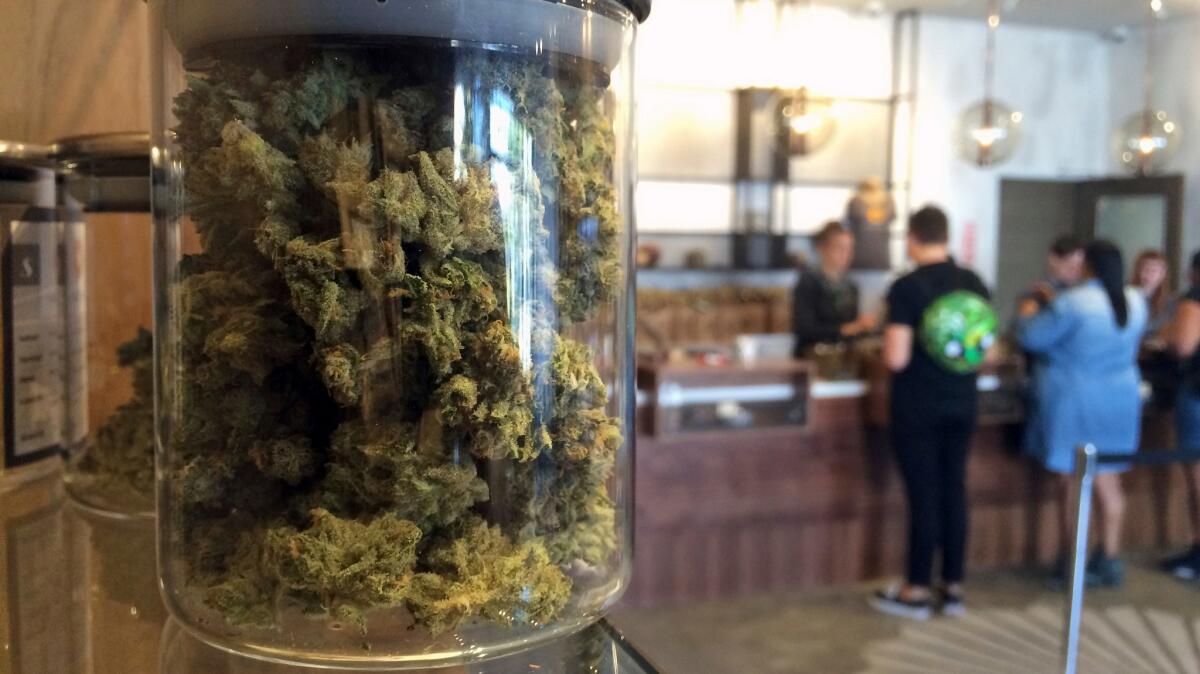Editorial: Don’t make marijuana California’s cash cow

Running out of time and options to raise money to address the homelessness crisis, the Los Angeles County Board of Supervisors turned Tuesday to a new funding source: weed. The supervisors agreed to seek voters’ approval in November for a gross receipts tax of up to 10% on marijuana businesses. But it’s far from clear that marijuana could — or should — be the pot of gold that county leaders are hoping for.
The board has spent the last several months trying to figure out a way to raise the $450 million a year that county officials estimate they need to provide outreach, mental health services, rental subsidies and housing for the homeless. But proposal after proposal has been taken off the table — Gov. Jerry Brown wouldn’t support changing state law to allow the county to consider a tax on millionaires, and supervisors balked at proposing sales or parcel tax hikes that would compete with ballot measures to raise taxes for public transportation and parks. With the deadline looming to put something on the November ballot, the board voted to go with the pot tax — the most iffy proposal of them all.
Heavy taxes could push up the price of pot so much that customers and suppliers return to the black market.
The marijuana tax measure would be on the same ballot as Proposition 64, which would make recreational use of marijuana legal under state law (it would remain verboten under federal statutes). The Adult Use of Marijuana Act is polling well so far — some 60% of likely voters have said cannabis should be legalized. Still, there’s no guarantee that Prop. 64 will pass. If it does and two-thirds of county voters also support the pot tax, the county could collect as much as $130 million a year. (That’s significantly less than the local sales or parcel tax measures mulled by the county would have raised.) But if Prop. 64 fails and the county measure passes, the county’s gross receipts tax would apply just to medical marijuana businesses, which would generate only about $13 million a year for homelessness services.
Supervisors are gambling on the arrival of legal pot. But even if voters support legalization, there’s another reason to be concerned: Elected officials are increasingly counting on marijuana to fund public programs without considering the consequences of jacking up the price of legally purchased pot. Prop. 64 would slap a 15% excise tax on recreational marijuana. That’s in addition to state and local sales taxes, which range from 7.5% to 10% depending on the county and city. The county’s proposed tax of up to 10% on marijuana businesses’ gross receipts — that is, the merchants’ total revenue — would add another layer, as would any municipal taxes on marijuana sellers. For example, the city of Los Angeles imposes a 6% gross receipts tax on medical marijuana outlets. Although such taxes would be paid by businesses, the cost would almost certainly be passed on to their customers.
This is exactly what a Blue Ribbon Commission on Marijuana Policy warned against last year: Don’t treat legal marijuana as a cash cow. The panel, which was organized by Lt. Gov. Gavin Newsom and included legal, health and policy experts, said government agencies should be cautious in setting taxes so as not to undermine the goals of legalization. In particular, the commission noted, one goal of legalization is reduce the power and profit of the violent drug cartels that have trafficked in illicit marijuana. But heavy taxes could push up the price of pot so much that customers and suppliers return to the black market.
At what point do all the proposed and existing taxes push the price of pot too high? It’s too early to determine, and we reserve judgement on the marijuana tax because, frankly, homelessness is such a crisis that all options must be on table. But here’s a word of caution to county, state and local leaders: Legal marijuana should not be seen as the solution to your revenue problems.
Follow the Opinion section on Twitter @latimesopinion and Facebook
More to Read
A cure for the common opinion
Get thought-provoking perspectives with our weekly newsletter.
You may occasionally receive promotional content from the Los Angeles Times.










